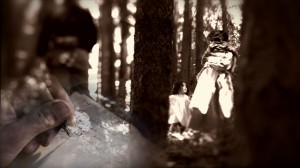>> Making the Film
>> Credits
>> Director's Statement
Paskenta: Nomlaqa Bōda
100 minutes, shot in High Definition
The serene hills of the Sacramento River Valley have not forgotten the centuries-long struggle of the Paskenta Band of Nomlaki Indians. Theirs is a story that was shaped, in part, through a difficult past, but that is optimistic and hopeful for the future.

Research for shooting the Walk to Round Valley was drawn from oral histories of Tribal members, and from a journal and report kept by Captain Stark who led the military unit.
Like many Native American tribes across the U.S., the Nomlaki of Northern California were confined on military reservations and removed from their land in brutal fashion during the sprint by settlers to grab rich farmland. After a gradual return to their aboriginal lands, the Nomlaki rebuilt their lives—but this would prove to be a brief respite. In 1957, the U.S. government unlawfully terminated the Tribe, denying the Nomlaki people their nation’s rights.
Paskenta: Nomlaqa Bōda is a story of identity, struggle and resilience as the Nomlaki face down the U.S. Congress to successfully reclaim their history, restore their sovereignty, and revitalize the culture of a displaced tribe, building a powerful vision for the future. This film is told solely through the words of Tribal Elder Everett Freeman and other Nomlaki Tribe members as they trace the rise, fall and rise again of their cherished people.
Nomlaqa Bōda translates as both “I am Nomlaki” and “We are Nomlaki” a duality that was an intentional and central theme throughout the creation of this film. Today, the Nomlaki live in the modern world but are deeply rooted in their past. Oral histories are at the core of the film, blending a traditionally non-linear narrative with a traditionally linear art form. The film traces concurrently the history of the Nomlaki Tribe and the unfolding of one family’s experiences.
Paskenta: Nomlaqa Bōda was produced in close collaboration with the Paskenta Band of Nomlaki Indians. The filmmakers were guided by the Tribal Council and other tribal leaders through every aspect of the project, from conception through post-production.
